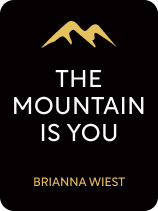

This article is an excerpt from the Shortform book guide to "The Mountain Is You" by Brianna Wiest. Shortform has the world's best summaries and analyses of books you should be reading.
Like this article? Sign up for a free trial here.
What are some The Mountain Is You book quotes? How can these quotes help you transform yourself?
When you self-sabotage, you create a barrier between who you are and who you want to be. In The Mountain Is You, Wiest explains that you can overcome this barrier by identifying, understanding, and eliminating the self-sabotaging behaviors that hold you back.
Find out how to break down this barrier with quotes from The Mountain Is You.
The Mountain Is You Quotes
Achieving your life’s purpose and becoming the best version of yourself often seems impossible. However, in The Mountain Is You, Brianna Wiest explains that the only thing holding you back is yourself—and your self-sabotaging behaviors. Wiest explains that you self-sabotage when you desire a change—in yourself, your lifestyle, your career, and so on—but are too afraid to act.
To make a change in your life, read these The Mountain Is You book quotes.
“You start to let go on the day you take one step toward building a new life and then let yourself lie in bed and stare at the ceiling and cry for as many hours as you need.”
To identify your ideal self, Wiest recommends engaging in meditation with your future self. First, find a quiet place, sit down with a pen and paper, take deep breaths to center yourself, and release any fears or negative emotions. When you feel totally relaxed, visualize the highest version of yourself sitting across from you. Then, take note of how they look, behave, speak, and communicate through their body language; what are they wearing, how are they feeling, and what do they do every day?
Next, listen to the advice that this future self wants to give you, even if it’s something you might disagree with at first. This advice should be uplifting, caring, and helpful. Now, imagine the particular aspects of this person’s life that allow them to live their purpose—where they’re living, what job they’re doing, the relationships they have, their daily tasks, their habits, and so on. Finally, imagine them giving you the key to that life—their life, routines, behaviors, and skills are now yours. This final step will put you in an “action” mindset that encourages you to enact the tasks and behaviors necessary to become your ideal self.
“Either way, mental strength is not just hoping that nothing ever goes wrong. It is believing that we have the capacity to handle it if it does.”
Once you’ve identified your self-sabotaging behaviors, Wiest explains that the next step in overcoming them is to identify the mental or emotional (ME) deficiencies they stem from. As we discussed previously, every self-sabotaging behavior is designed to protect you from a certain fear, and these fears develop because we lack the ME skills to effectively face them. Once we pinpoint which skills we lack, we can learn them and lessen the need to self-sabotage.
First, analyze each of the self-sabotaging behaviors on your list and think about why you do them. Each why will be one of your fears. For example, if you procrastinate taking action toward your goals, it may be because you fear failure. If you spend time with people who make you feel bad, it may be because you fear being alone. If you have trouble committing to things, it may be because you’re afraid to trust your decisions.
Next, identify your ME deficiencies by connecting each of your fears to a mental or emotional skill that you would need to overcome it. For example, to overcome a fear of failure, you need to improve your self-confidence. To overcome a fear of being alone, you need to improve your ability to be independent—that might mean working on self-confidence, self-love, and other skills to fulfill your emotional needs independently. To overcome a fear of commitment, you need to work on self-trust and self-confidence.
“When we hold onto fear and pain after something traumatic has passed, we do it as a sort of safety net. We falsely believe that if we constantly remind ourselves of all the terrible things that we didn’t see coming, we can avoid them. Not only does this not work, but it also makes you less efficient at responding to them if they do.”
Another The Mountain Is You book quote explains that you can overcome your self-sabotaging behaviors by listening to your intuition (your instinctive understanding of how to act) and differentiating it from your fears. This is because while self-sabotaging behaviors are driven by your fears, productive behaviors are often driven by your intuition. If you learn how to get in touch with your intuition, you can consciously override self-sabotaging behaviors and replace them with actions that bring improvement and progress toward goals.
To follow your intuition rather than your fears, recognize when your thoughts or feelings are driving you toward a certain action or behavior, and take a moment to reflect. Wiest explains that we’re often subconsciously driven by our fears because they’re louder and more prominent than our intuition. Fears tend to manifest when we think we know what will happen in the future, worry about something, panic, have an emotional reaction like getting angry or jealous, or feel pumped up with adrenaline. If you find yourself being driven to act based on any of these factors, take a step back and acknowledge that your fears are pushing you toward self-sabotage.

———End of Preview———
Like what you just read? Read the rest of the world's best book summary and analysis of Brianna Wiest's "The Mountain Is You" at Shortform.
Here's what you'll find in our full The Mountain Is You summary:
- Why the only thing standing in your way of achieving your goals is you
- How to achieve your life purpose and become your ideal self
- How to identify your self-sabotaging behaviors and stop them






